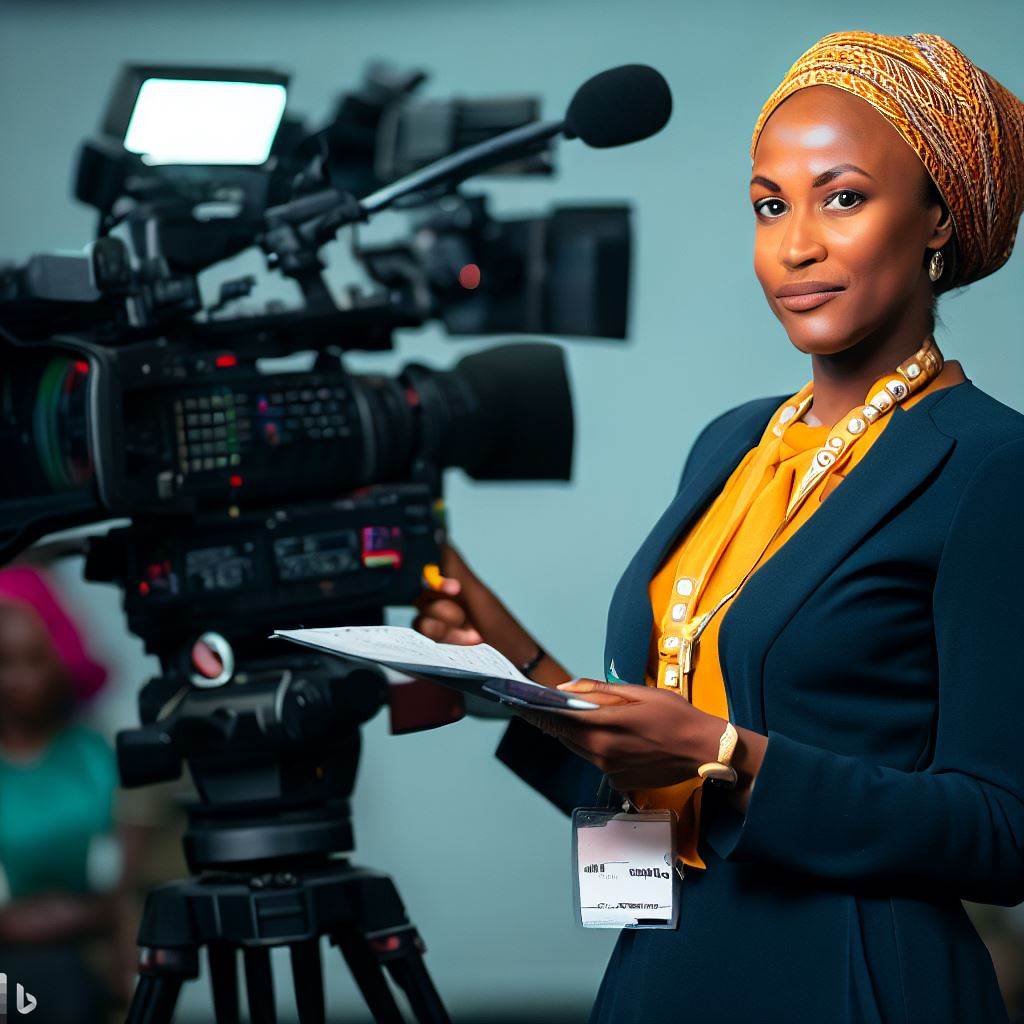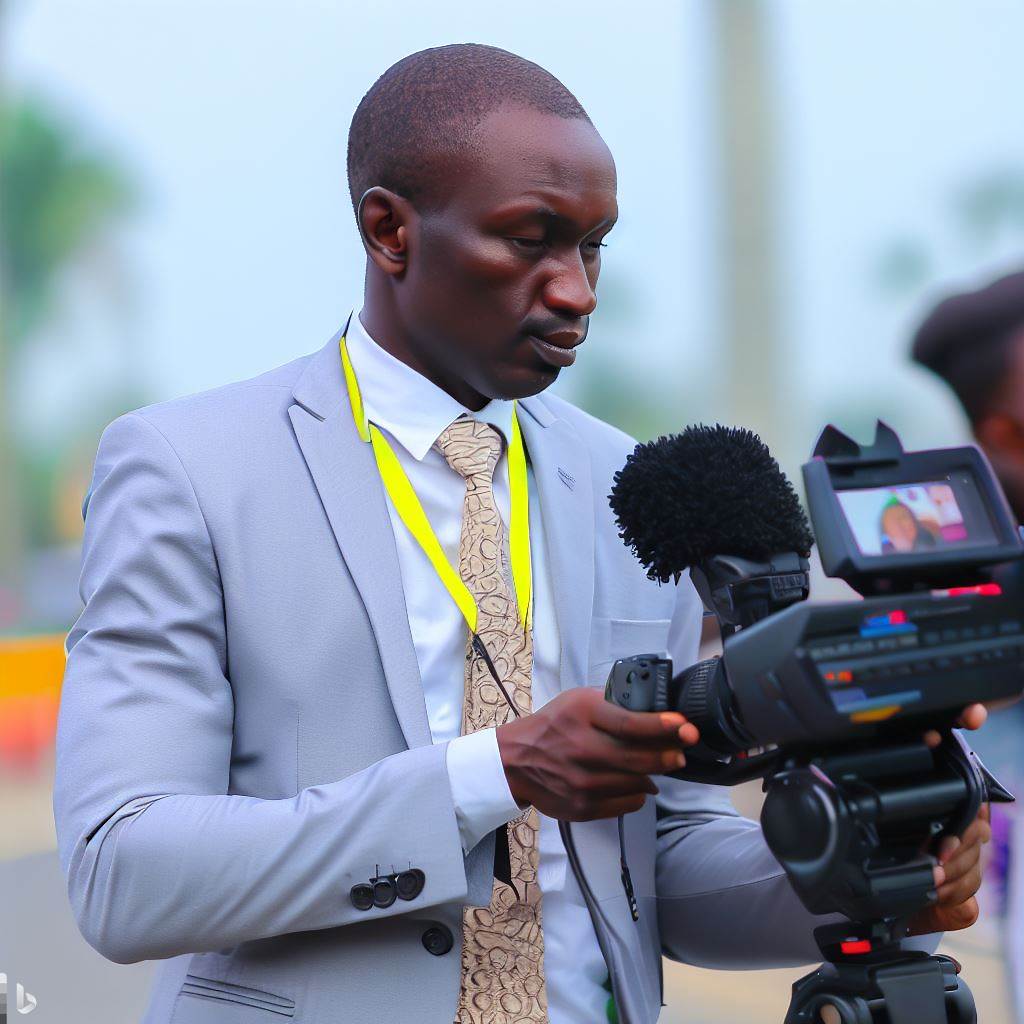Introduction
The Role of Women in TV Reporting Industry is worth exploring as it sheds light on gender equality issues and women’s empowerment in the media sector.
Understanding the significance of this topic is crucial in promoting diversity and inclusivity in the industry.
Women’s representation in TV reporting not only challenges stereotypes but also brings unique perspectives and insights to the field.
It is essential to recognize and celebrate the contributions and achievements of women in Nigeria’s TV reporting industry.
This blog section aims to delve deeper into this subject and highlight the challenges and achievements of women in this field.
Historical Background
The Role of Women in Nigeria’s TV Reporting Industry has been noteworthy across history.
Despite entrenched gender biases, women have persevered to leave an indelible mark in the field.
Initially underrepresented in news reporting during the industry’s inception, women were confined to peripheral roles due to traditional societal expectations.
These gender norms posed substantial hindrances, perpetuating discrimination and limiting advancement.
Yet, women shattered barriers with exceptional skills and persistence, dispelling doubts about their credibility and capacity to cover diverse topics.
Pioneers like Eugenia Abu, Ruth Benamaisia Opia, and Bimbo Oloyede challenged norms and inspired later generations.
They demonstrated that gender didn’t impede success in TV reporting.
With time, opportunities expanded. Women anchored prime-time news, hosted shows, and utilized digital platforms for their narratives.
Today, they continue to contribute significantly, addressing politics, economics, social issues, and human-interest stories impartially.
Despite remaining challenges, progress in breaking down barriers and fostering equality is evident.
Through their impactful work, women reshape the industry, inspiring future generations of female journalists and propelling the journey towards industry-wide transformation.
Current Scenario
- The representation and participation of women in Nigeria’s TV reporting industry is being evaluated.
- Statistics and data regarding the gender gap in the industry will be provided.
- The major TV networks and their efforts to promote gender equality will be discussed.
Evaluating the Representation and Participation of Women
The current state of women’s involvement in Nigeria’s TV reporting industry is a matter of crucial importance.
It is essential to evaluate the existing level of representation and participation in order to identify any gender disparities.
Statistics indicate that women still face significant challenges in achieving equal opportunities in the TV reporting industry.
According to recent data, women occupy fewer positions compared to their male counterparts. This gender gap needs to be addressed for the industry to progress towards gender equality.
The Gender Gap in Nigeria’s TV Reporting Industry
Statistics reveal a lopsided representation of women in Nigeria’s TV reporting industry, with males dominating the majority of roles.
Only a limited number of women are seen as primary news presenters or anchors, while the majority are relegated to supporting roles.
Recent data highlights that women constitute only about 30% of total TV reporters in Nigeria.
This significant underrepresentation brings attention to the pressing need for more gender-inclusive practices within the industry.
Promoting Gender Equality: Efforts by Major TV Networks
Several major TV networks in Nigeria have recognized the importance of promoting gender equality and are taking various measures to bridge the gender gap in the industry.
Networks like Channel Television have implemented policies to promote women’s inclusion, ensuring equal opportunities for female reporters in various departments.
By providing mentoring programs and equal resources, they strive to empower women in the TV reporting field.
Similarly, Nigerian Television Authority (NTA) has unveiled initiatives to encourage more women to become TV reporters.
They have established gender-sensitive recruitment processes and training programs, aiming to enhance the representation and participation of women within their organization.
African Independent Television (AIT) has also taken proactive steps towards gender equality.
They actively encourage women to take up positions in news reporting, ensuring equal pay and opportunities for career advancement.
These efforts by major TV networks contribute to creating a more inclusive space for women in Nigeria’s TV reporting industry. However, there is still a long way to go in achieving full gender equality.
The current scenario of women in Nigeria’s TV reporting industry demands attention. The evaluation of representation and participation in the industry reveals a persisting gender gap that needs to be addressed.
However, major TV networks are taking commendable steps to promote gender equality by implementing inclusive policies and providing equal opportunities.
These efforts are instrumental in paving the way for a more balanced and representative TV reporting industry in Nigeria.
Continued commitment, awareness, and actions by both industry stakeholders and society at large are essential to bring about lasting change and empower women in Nigeria’s TV reporting industry.
Gender Bias and Challenges
- Gender bias and stereotypes persist within Nigeria’s TV reporting industry, creating hurdles for women.
- Women journalists often face challenges regarding equal opportunities, payment, and access to senior positions.
Women journalists often face challenges regarding equal opportunities, payment, and access to senior positions. - These challenges are exacerbated by societal perspectives that contribute to gender inequality in the industry.
The role of women in Nigeria’s TV reporting industry is hindered by entrenched gender bias and stereotypes, impeding their progress despite recent advancements.
These biases perpetuate stereotypes, portraying women as less competent than male counterparts, reinforcing the male-dominated perception.
Unequal treatment also persists, as women encounter obstacles in securing equal opportunities, pay, and senior positions.
Societal norms contribute by limiting women’s options due to traditional gender roles that prioritize domestic duties over journalism careers.
These norms discourage women from pursuing reporting due to perceived incompatibility with their roles.
To tackle these challenges, fostering awareness about biases and implementing policies for equal opportunities and fair pay is vital.
Tailored mentorship and training programs can empower women to overcome barriers.
Shifting societal views by promoting successful women journalists and dispelling male-exclusive notions is essential.
Encouraging young girls to consider reporting careers is pivotal in transforming the industry into a more inclusive and diverse landscape.
Read: Challenges Faced by TV Reporters in Nigeria

Success Stories
Breaking barriers and leaving an indelible mark, these Nigerian female journalists have transformed the TV reporting landscape:
- Chika Oduah: A trailblazing journalist, Chika covered impactful stories like the Chibok girls’ abduction and northeast insurgency.
- Kiki Mordi: Renowned for “Sex for Grades,” Kiki’s exposé on campus harassment ignited reform discussions nationwide.
- Adaure Achumba: A prominent TV reporter, Adaure covered pivotal events, from the 2015 elections to the #EndSARS movement.
- Stephanie Busari: As CNN Africa Bureau Editor, Stephanie’s global-recognized work encompassed the Chibok incident and Ebola crisis.
- Funmi Iyanda: Veteran TV host of “New Dawn,” Funmi tackled societal issues and set an inspiring precedent.
Their achievements catalyzed change. From corruption to human rights, their reports highlighted critical issues, fostering a more informed society.
A beacon for aspiring female journalists, they prove determination conquers in a male-dominated arena.
Their stories underscore journalism’s transformative power, driving change and amplifying unheard voices.
In summary, these remarkable Nigerian TV journalists shattered norms, shaped the industry, and inspire others to forge impactful paths, proving gender holds no bounds in making a difference through journalism.
Read: Job Outlook for Television Reporters in Nigeria
Learn More: Behind the Scenes: Nigerian TV Production Floor Management
Find Out More: Nigeria’s Telecommunications Regulatory Environment and Jobs
Efforts towards Gender Equality
In recent years, Nigeria’s TV reporting industry has witnessed various initiatives, policies, and programs aimed at promoting gender equality.
These efforts have been instrumental in empowering women journalists and bridging the gender gap in the industry.
1. Initiatives, Policies, and Programs
- Gender Parity: Many media organizations have recognized the importance of gender parity and implemented policies to ensure equal opportunities for men and women in the TV reporting industry.
- Quota Systems: Some initiatives have introduced quota systems to increase the representation of women journalists in newsrooms and decision-making positions.
- Anti-Discrimination Laws: The Nigerian government has enacted laws that prohibit gender discrimination in the workplace, providing a legal framework to support gender equality in the TV reporting industry.
- Mentorship Programs: Several organizations have established mentorship programs to provide guidance and support to aspiring women journalists, helping them navigate the challenges of the industry.
- Training Workshops: Media houses and journalism associations organize training workshops specifically designed for women journalists, equipping them with necessary skills and knowledge to excel in their careers.
- Flexible Work Policies: Some media organizations have implemented flexible work policies to accommodate the needs of women journalists, such as maternity leave, childcare facilities, and flexible working hours.
2. Empowering Women Journalists
- Women in Journalism Africa (WiJA): WiJA is an organization that focuses on empowering women journalists across the continent. They provide platforms for networking, capacity building, and advocacy.
- Nigerian Women in Journalists (NAWOJ): NAWOJ is a professional association that promotes the welfare and professional development of women journalists in Nigeria. They organize conferences, training programs, and mentorship initiatives.
- International Federation of Journalists (IFJ): IFJ has been actively involved in advocating for gender equality in journalism. They work with local unions and associations to promote women’s rights and equal representation in the media industry.
3. Examples of Successful Interventions
- Journalism Scholarships: Some organizations offer journalism scholarships exclusively for women, encouraging more females to pursue careers in TV reporting.
- Gender-Focused Research Studies: Academic institutions and media organizations conduct research studies on gender representation and issues specific to women journalists. This helps identify challenges and develop targeted interventions.
- Affirmative Action Programs: Some media organizations have implemented affirmative action programs, providing reserved positions or special incentives for women journalists to encourage their participation and growth in the industry.
- Recognition and Awards: Media awards that specifically recognize outstanding women journalists have been introduced to celebrate their achievements and inspire others.
- Sensitization Campaigns: Various campaigns and awareness programs have been launched to sensitize the public about the importance of gender equality in the media, challenging stereotypes and prejudices.
Overall, the combined efforts of initiatives, organizations, and programs have contributed significantly towards achieving gender equality in Nigeria’s TV reporting industry.
However, continuous commitment and sustained action are necessary to ensure further progress and create a more inclusive and diverse media landscape.
By promoting and empowering women journalists, Nigeria can harness their talent and perspectives, ultimately enriching the quality and diversity of news content.
Read: The Career Path of Nigerian Television Journalists
Future Prospects
Examine the potential future developments and changes in the role of women in Nigeria’s TV reporting industry.
- Increasing number of women joining the TV reporting industry in Nigeria.
- Greater representation of women in senior positions, including as news anchors and correspondents.
- Introduction of mentorship and training programs to build the skills and confidence of women reporters.
- Implementation of policies promoting gender equality within newsrooms and across media organizations.
- Further recognition and appreciation of the unique perspectives and storytelling abilities of women journalists.
Discuss any emerging trends or opportunities for advancement.
- Integration of digital platforms and social media into TV reporting, providing new avenues for women to showcase their work.
- Opportunities for women to cover a wider range of topics beyond traditional gender-focused issues.
- Inclusion of diverse voices and perspectives, enabling women to tell stories from various communities.
- Collaboration with international news organizations, allowing Nigerian women journalists to gain global exposure and experience.
- Exploration of investigative reporting and long-form storytelling, giving women in TV reporting the chance to delve deep into issues.
Evaluate the importance of continued efforts to ensure gender equality.
- Promoting gender equality enables women to contribute fully and meaningfully to Nigeria’s TV reporting industry.
- Gender equality enhances the accuracy and diversity of news coverage, improving its overall quality.
- Equal opportunities drive innovation and creativity as women bring fresh perspectives and ideas to the field.
- Creating a supportive and inclusive environment benefits not only women but also society as a whole.
- By valuing and empowering women, the TV reporting industry in Nigeria can become a leading example for other sectors.
In the end, the future prospects for women in Nigeria’s TV reporting industry are promising.
With increasing numbers, greater representation in senior positions, and the introduction of mentorship and training programs, women are stepping into the field with confidence.
Emerging trends, such as the integration of digital platforms, provide new opportunities for advancement and storytelling.
Continued efforts to ensure gender equality are crucial, as they enhance the industry’s quality, spur innovation, and contribute to a more inclusive society.
By striving for equal opportunities, Nigeria’s TV reporting industry can create a diverse and dynamic landscape, setting an example for other sectors to follow.
Read: The Evolution of Television Editing in Nigeria
Explore Further: Interviewing Nigeria’s Top Telecommunications Professionals
Conclusion
It is evident that women have faced numerous challenges in Nigeria’s TV reporting industry.
However, their resilience and determination have allowed them to break barriers and make significant contributions.
Promoting gender equality in this industry is crucial for several reasons.
Firstly, it ensures a diverse and comprehensive representation of voices and perspectives, which leads to more balanced and accurate reporting.
Secondly, gender equality fosters an environment of creativity, innovation, and collaboration, resulting in higher quality journalism.
To support and empower women journalists in Nigeria, we must take action.
Firstly, media organizations should implement policies that promote gender equality and provide equal opportunities for women to advance in their careers.
It is essential to address the existing gender pay gap and ensure fair and equal compensation.
Additionally, providing training, mentorship, and networking opportunities for women journalists can help them develop their skills and expand their professional networks.
Furthermore, society as a whole must play a role in challenging gender stereotypes and biases.
By recognizing and celebrating the achievements of women journalists, we can inspire and encourage young girls to pursue careers in journalism.
Educating the public about the importance of gender equality in the media will also help create a more inclusive and equitable industry.
In summary, achieving gender equality in Nigeria’s TV reporting industry requires collective effort.
It is not only about empowering women but also about transforming the industry into a more inclusive and representative space.
By promoting and supporting women journalists, we can create a stronger and more diverse media landscape in Nigeria.
It is time to take action and empower the women who play a crucial role in shaping Nigeria’s narrative.




